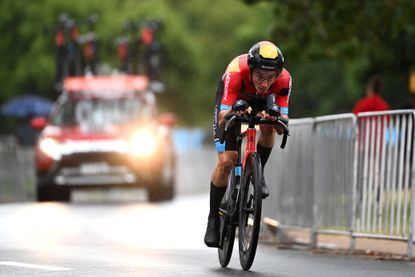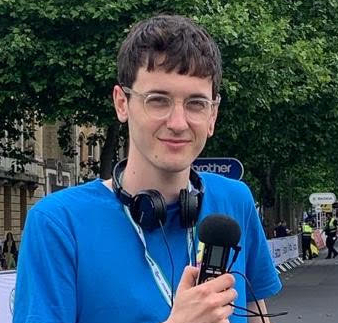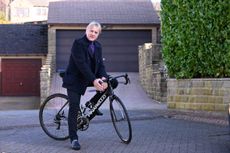UCI to clamp down on extreme brake lever position
The angle of riders’ brake levers will be closely monitored from next season


The UCI has announced plans to clamp down on riders turning in their handlebar hoods from 2024.
In recent years, many riders have tilted their hoods inwards, forcing them to narrow their body’s frontal area and creating a more aerodynamic position. However, when taken to the extreme the change can make it more difficult to grip the hoods and some in the peloton have called the trick “stupid” and “dangerous”.
The UCI has now said it will impose restrictions on the angles used.
In a statement shared on Thursday, the UCI wrote: "Positioning the levers with an extreme inclination limits the braking capacity of the riders and constitutes a modification of the product beyond its intended use.
"Such positioning will be restricted in 2024. In 2025, new regulations will come into force requiring compliance with the installation guidelines established by brake lever manufacturers."
Cycling Weekly has seen an unpublished document entitled ‘2024 regulation changes’, which appears to show a new tool the UCI will use to measure what it calls “brake lever inclination”. The tool wraps around the hood, enforcing a limit on the tilted angle of around four or five degrees.
One industry expert, who asked to remain anonymous, told Cycling Weekly that the rule change “should not come as a surprise”.
“Turning your levers in is ridiculous and dangerous and stupid,” they said. “It’s a safety thing, basically. If you turn your levers in at 90 degrees, like some of these juniors are doing, you cannot reach the brakes, you cannot change gear. Yes, you might have a very nice aero-looking position when you’re on the hoods, but the rest of the time, you can’t climb safely, you can’t hit the brakes properly.”
Speaking to Cycling Weekly earlier this year, UAE Team Emirates rider George Bennett said turned-in levers had already caused incidents in races.
“What sh*ts me is that when everybody slams on their brakes fully, they can’t use their brakes,” Bennett said. “I buy into [the aero argument], it works, it saves watts, but saving watts is only one thing. I like using my brakes.”
Rider adjustments to brake hoods became more prominent after the UCI outlawed the puppy paws position - in which a rider rests their forearms on the handlebars - in April 2021. The following month, Taco van der Hoorn of the then-named Intermarché-Wanty-Gobert Matériaux soloed to victory on his Grand Tour debut at the Giro d’Italia, his aero-optimised hoods attracting attention.
Bahrain Victorious rider Pello Bilbao then adopted an even more extreme angle in a road bike time trial at the Tour Down Under this January.
According to CW’s industry source, this safety issue is not limited to pro riders. “I feel as though this is a perception issue that will trickle down to the more susceptible-to-influence juniors,” they said. “If you’ve got an entire field of juniors doing this, it’s going to be a complete nightmare, and people are going to hurt themselves.
“For the UCI to crack down on something that people might do, which is less safe, before there’s an issue, I think is a good thing.”
Cycling Weekly approached the UCI for comment, but the governing body did not respond.

Thank you for reading 20 articles this month* Join now for unlimited access
Enjoy your first month for just £1 / $1 / €1
*Read 5 free articles per month without a subscription

Join now for unlimited access
Try first month for just £1 / $1 / €1
Get The Leadout Newsletter
The latest race content, interviews, features, reviews and expert buying guides, direct to your inbox!

Tom joined Cycling Weekly as a news and features writer in the summer of 2022, having previously contributed as a freelancer. He is the host of The TT Podcast, which covers both the men's and women's pelotons and has featured a number of prominent British riders.
An enthusiastic cyclist himself, Tom likes it most when the road goes uphill and actively seeks out double-figure gradients on his rides.
He's also fluent in French and Spanish and holds a master's degree in International Journalism.
-
 In search of the world's best club jersey: Jubilee Park CC v Kibworth Velo Club
In search of the world's best club jersey: Jubilee Park CC v Kibworth Velo ClubEvery week we pit two club kits against each other and you get to vote on the best designs
By James Shrubsall Published
-
 'I had to wait at the top of every hill' – the highs and lows of Malcolm Elliott's career in the fast lane
'I had to wait at the top of every hill' – the highs and lows of Malcolm Elliott's career in the fast laneThroughout his two-part career, no-one epitomised Sheffield steel like Cycling Weekly's 2023 Lifetime Achievement award winner Malcolm Elliott
By James Shrubsall Published

